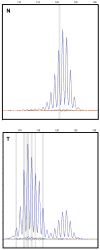Microsatellite instability in colorectal cancer-the stable evidence
- PMID: 20142816
- PMCID: PMC3427139
- DOI: 10.1038/nrclinonc.2009.237
Microsatellite instability in colorectal cancer-the stable evidence
Abstract
Microsatellite instability (MSI) is the molecular fingerprint of a deficient mismatch repair system. Approximately 15% of colorectal cancers (CRC) display MSI owing either to epigenetic silencing of MLH1 or a germline mutation in one of the mismatch repair genes MLH1, MSH2, MSH6 or PMS2. Methods to detect MSI are well established and routinely incorporated into clinical practice. A clinical and molecular profile of MSI tumors has been described, leading to the concept of an MSI phenotype in CRC. Studies have confirmed that MSI tumors have a better prognosis than microsatellite stable CRC, but MSI cancers do not necessarily have the same response to the chemotherapeutic strategies used to treat microsatellite stable tumors. Specifically, stage II MSI tumors might not benefit from 5-fluorouracil-based adjuvant chemotherapy regimens. New data suggest possible advantages of irinotecan-based regimens, but these findings require further clarification. Characterization of the molecular basis of MSI in CRC is underway and initial results show that mutations in genes encoding kinases and candidate genes with microsatellite tracts are over-represented in MSI tumors. Transcriptome expression profiles of MSI tumors and systems biology approaches are providing the opportunity to develop targeted therapeutics for MSI CRC.
Conflict of interest statement
The authors declare no competing interests.
Figures



References
-
- Aaltonen LA, et al. Clues to the pathogenesis of familial colorectal cancer. Science. 1993;260:812–816. - PubMed
-
- Ionov Y, Peinado MA, Malkhosyan S, Shibata D, Perucho M. Ubiquitous somatic mutations in simple repeated sequences reveal a new mechanism for colonic carcinogenesis. Nature. 1993;363:558–561. - PubMed
-
- Thibodeau SN, Bren G, Schaid D. Microsatellite instability in cancer of the proximal colon. Science. 1993;260:816–819. - PubMed
-
- Aaltonen LA, et al. Incidence of hereditary nonpolyposis colorectal cancer and the feasibility of molecular screening for the disease. N Engl J Med. 1998;338:1481–1487. - PubMed
-
- Hampel H, et al. Screening for the Lynch syndrome (hereditary nonpolyposis colorectal cancer) N Engl J Med. 2005;352:1851–1860. - PubMed
Publication types
MeSH terms
Substances
Grants and funding
LinkOut - more resources
Full Text Sources
Other Literature Sources
Medical
Miscellaneous

